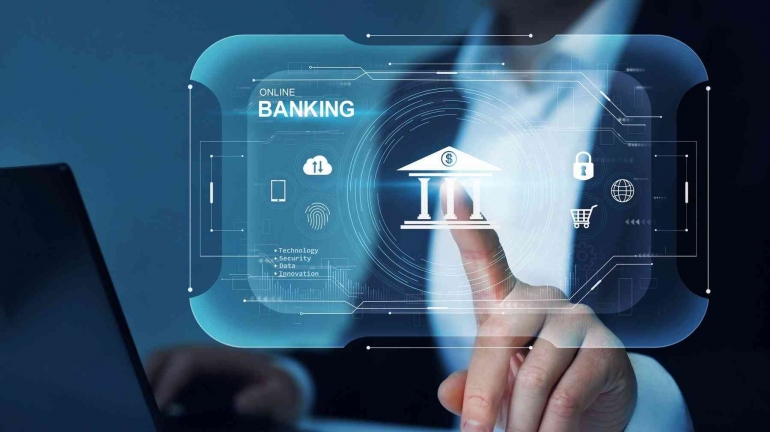Fintech in Indonesia has grown rapidly over these past few years, this growth happened in line with the development of innovation and technology. With the advancement of information technology, such as the internet, smartphones, and big data analytics. financial technology (fintech) enables the quicker and more affordable distribution of financial services. Because fintech offers alternative services to the post-global financial crisis society in Indonesia, including the Asian financial crisis of 1997-1998 and the global financial crisis that happened back in 2008 and kept innovating, fintech poses a challenge to conventional financial institutions that are now today.
While improving services for customers with bank accounts, fintech also targets groups that banks have overlooked. Based on cross-sector services, fintech has revolutionized the financial services sector and will increase its market share in the years to come. New actors in the financial services industry have emerged thanks to the dynamic market, especially non-financial firms like internet service providers and smartphone manufacturers. This also opens up opportunities for the millennial generation to pursue fintech entrepreneurship. Fintech presents a chance for Indonesia to close existing finance and financial inclusion gaps.
With the high increase of users in fintech, it is also proof that technological innovation is currently one of the primary success factors for businesses looking to improve the maturity of their product life cycles, including those in the financial sector. The product life cycle is where Each business goes through four stages: introduction, growth, maturity, and decline. Innovation is one way to enhance the maturity stage. These fintech and digital financing are innovations in the financial services industry. Particularly for Indonesia's small and medium enterprises (SMEs), digital financing makes doing business easier. Small and Medium Enterprises (SMEs) are essential to Indonesia's economy. Therefore their role in supporting economic growth is crucial. In today's world, financial services must provide products and services quickly. Given its diverse topography and many islands, Indonesia needs quick product or service delivery, especially for financing Small and Medium Enterprises (SMEs), which plays a big part and contributes to Indonesia's economy.
Serious dangers accompany fintech's benefits. Customer security and data protection have been the primary priorities. As fintech is a user-friendly platform that delivers financial services, anybody with an internet connection might potentially exploit client data. In the worst-case scenario, fintech may threaten financial stability if users fail to minimize the risks associated with their businesses. Activities that go beyond the strict regulatory framework and pose a danger to the larger financial system. A large disruption in these services or the disintermediation of regulated companies might seriously affect the economy.
The biggest challenge for regulators is to find a balance between new ideas, the security of customers, and the integrity of the financial markets. Fintech should be regulated in a way that encourages innovation and guides it to be responsible. This means that there will need to be a balanced regulatory framework. This strategy fits with the "light touch and safe harbor" approach to regulation that the President of Indonesia, Joko Widodo, talked about at the 2018 Annual Meetings of the International Monetary Fund and World Bank Group (IMF-WBG) in Bali.
Currently, there are two authorities in Indonesia that regulate fintech. OJK regulates all fintech that provides financial services, including digital banking, P2P lending, crowdfunding, insure-tech, investment, and market aggregators. The Bank of Indonesia controls fintech related to payments. In this article, I will explain and elaborate on the safety regulations for fintech users in Indonesia, such as existing regulations on the fintech industry and Indonesia's fintech regulatory strategy held by those two authorities.
Finance is the most regulated industry, more so than any other, regarding consumer protection. Consumer protection covers a broad range of issues, including but not limited to product liability, privacy rights, unfair business practices, fraud, misrepresentation, and other company/consumer interactions. To protect consumers, the Financial Services Authority (OJK) adopted Regulation No. 01/POJK. 07/2013 on the Protection of Consumers in Financial Services Sectors. According to this rule, financial service institutions must disclose and communicate accurate, honest, transparent, and non-misleading information regarding their goods and services.
Security vulnerabilities will continue to emerge as the banking sector's digitization progresses. As technology progresses, many loopholes and a new type of criminality emerge. For example, skimming is the most popular way of non-cash transactions using cards. Since 2013, BI has established the Payment System Consumer Protection Division to respond to increased payment transactions and strengthen its commitment to the interests of consumers. The main functions of this division are education, consultation and facilitation.
The banking industry in Indonesia has found that technology has become a double-edged sword. It speeds up the growth of online banking, but it also makes it harder to keep data safe. The rise of automation has caused the number of digital banking transactions to go up. Because digital banking is so easy to use, customers' private information is more likely to be accessed. Since the cases of ATM skimming at BRI in Indonesia, the bank has been launching a digital signature verification method for mobile banking transactions to protect them from cyber threats. From the point of view of the banking industry, cyber threats have become a top risk as the use of digital banking grows. According to the 2018 PwC Indonesia Banking Survey, cyber risk will be the biggest worry for the banking industry over the next two to three years.
We can conclude that the fast and rapid growth of fintech in the banking industry can carry out the considerable data protection and security risks. In line with the ever-increasing numbers of consumers and the risks it carries, the law must also be progressing towards the development of fintech in the banking industry.










